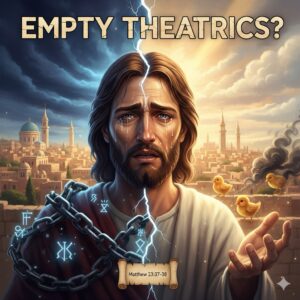Ephesians 2:1-5 says “And you were dead in the trespasses and sins in which you once walked, following the course of this world, following the prince of the power of the air, the spirit that is now at work in the sons of disobedience— among whom we all once lived in the passions of our flesh, carrying out the desires of the body and the mind, and were by nature children of wrath, like the rest of mankind. But God, being rich in mercy, because of the great love with which he loved us, even when we were dead in our trespasses, made us alive together with Christ—by grace you have been saved—” (ESV)
Calvinists interpret the phrase “dead in sin” in this passage to mean that a man is like a corpse in that he can’t respond to God unless God first makes him alive. They argue that regeneration precedes faith because if it didn’t, then faith would be impossible. “A corpse cannot believe” they say. A spiritual corpse cannot hear God until he reaches into your mind and regenerates you. They say that only after that can you then place your faith in Christ as your Savior and Lord. On the Calvinist view, you’re not saved because you believed in Jesus, you believe in Jesus because you’re saved. Now, in case the Calvinist tries to accuse me of a straw man, what I just said in the last sentence is actually almost verbatim from what Calvinist theologian R.C Sproul said. He wrote “We do not believe in order to be born-again. We are born-again in order to believe.” (Sproul, R.C. Chosen by God. Page 73.)
If they’re right, the Arminian view of salvation would be false. As we believe faith precedes regeneration. Are the Calvinists right?
“Dead” Language In Other Parts Of Scripture
To get an idea of what God’s Word really means when it says we’re “dead in sins” prior to becoming Christians, we need to look at other places in which the death metaphor is applied to lost people. Perhaps a good place to start is the very beginning of mankind, to the event that started this whole sin mess we’re in.
In Genesis 1-3, Adam and Eve are in the garden enjoying communion with their Creator (i.e God). God warned them not to eat the fruit from The Tree Of The Knowledge of Good and Evil, saying that in the day they ate of it, they would die (Genesis 2:17). Adam and Eve disobeyed God and ate the fruit from the Tree Of The Knowledge Of Good and Evil (Genesis 3:6). Were Adam and Eve “dead in trespasses and sin” (Ephesians 2:1)? Absolutely! Immediately they became consumed with guilt and they became afraid of God (Genesis 3:7). But were they spiritual corpses unable to hear or respond to God? No. This is seen a few verses later when we read that God was in the garden and asked Adam “Where are you?” and Adam responded “I heard you in the garden, and I was afraid because I was naked; so I hid.” (Genesis 3:8-10). Although Adam was “dead in sin”, he was able to hear God’s voice and communicate with him.
Genesis 4 records the murder of Abel at the hands of his brother Cain. Cain was born and raised in a world recently wrecked by sin. He refused to worship God in the way that God commanded and didn’t think he needed to offer a sacrifice to atone for the sins that he committed. He went through the motions, much like nominal Christians go through the motions today (they pray when they’re in trouble, they attend church, but they’re not really born again). Abel, on the other hand, offered a sacrifice to God sincerely, believing that he was a sinner in need of forgiveness and trusting that God would cleanse him of his wrong doings. This is why God was pleased with Abel’s offering, but not Cain’s. Cain became jealous of Abel because he always seemed to win God’s favor even though they were (externally at least) doing the exact same things. Cain’s envy caused him to hate his brother. Cain murdered Abel, and then fled the crime scene. God rhetorically asked Cain “Where is your brother Abel” and Cain responded “I don’t know. Am I my brother’s keeper?” God then said “What have you done? Listen! Your brother’s blood cries out to me from the ground. Now you are under a curse and driven from the ground, which opened its mouth to receive your brother’s blood from your hand. When you work the ground, it will no longer yield its crops for you. You will be a restless wanderer on the earth.”
We know from The New Testament that he was not a believer. We also know that “No murderer has eternal life in him.” (1 John 3:15). Ergo, Cain was “dead in trespasses and sin”. Yet we know from the text that God spoke to Cain and Cain heard Him. If he didn’t hear Him, he wouldn’t have been able to respond. When God said “Where is your brother?” Cain would have just kept running, totally unaware that God had asked him a question. Yet, according to the Calvinist’s reasoning, God would have to regenerate Cain before any back and forth discussion could occur. After all, he’s a dead man. A dead man can’t believe. A dead man can’t hear God’s voice and respond to it anymore than a dead man in a casket can respond to you. Yet, Genesis 4 contradicts such a notion, as does Genesis 3.
Finally, let’s consider The Parable Of The Prodigal Son, recorded in Luke 15:11-32. The son demands his father for his inheritance even before his father dies. His father is kind enough to grant his request. The son walks off and leaves his father, severing his relationship with him. He lives a wild and immoral lifestyle until the time came when a famine swept the land, the son became desperate for food, and returned to his father’s house. The man rejoiced to see his son come home, so he threw a feast for him, which invoked the envy of the prodigal son’s brother. The brother objected and the father responded “My son, you are always with me, and everything I have is yours. But we had to celebrate and be glad, because this brother of yours was dead and is alive again; he was lost and is found.”
In The Parable Of The Prodigal Son, the son was clearly not incapable of making decisions. He was nothing like Lazarus was when Lazarus was lying in the tomb for 4 days. The Prodigal son was clearly able to make decisions, including the decision to go home. Yet, the father still described his state of being as “dead” prior to his return! Now, I know that it’s problematic to press the incidental details of a parable in order to form doctrine. That’s NOT what I’m doing. Rather, I’m pointing out that the father in the story didn’t consider his son a corpse unable to make decisions, yet he still considered him dead. This indicates that what it means for a lost person to be dead in sins isn’t what The Calvinist would lead you to believe. But in that case, what does it mean?
Not A Corpse, Relationally Separated.
What does it mean to be “dead in sin”? Does it mean that a person is analogous to a corpse in that, just as a person cannot respond to anything you say unless he is brought back to life, so an unsaved person can’t respond to God unless He is brought back to life (i.e regenerated)? No. If it did, then there would be a contradiction in The Bible. Ephesians 2:1 would contradict Genesis 3, Genesis 4, and Luke 15:11-32. Since The Bible is inspired by a perfect God (2 Timothy 3:16), it cannot and will not contradict itself. What it means to be “dead in sins” is to be relationally separated from God.
Adam and Eve severed their relationship with God in the garden. Cain severed his relationship with God through his sins and unwillingness to repent. The prodigal son severed his relationship with his father. He was relationally (and also spatially) separated from his father. To be dead in sin means to not have a relationship with God.
This interpretation is supported by what Paul says in Ephesians 4:18-19:
“They are darkened in their understanding and separated from the life of God because of the ignorance that is in them due to the hardening of their hearts. Having lost all sensitivity, they have given themselves over to sensuality so as to indulge in every kind of impurity, and they are full of greed.” (emphasis mine)
I want you to see that in this passage the non-believer is not an inanimate corpse devoid of the ability to make choices. Non-believers are “darkened in their understanding and separated from the life of God because of the ignorance that is in them due to the hardening of their hearts.”
A person relationally separated from God does not love Him, spend time with Him, or want anything to do with Him. They go their own way to wallow in sin.
We use “death” language to refer to severed relationships even today. When a person cuts ties with someone, they’ll say “You’re dead to me”. He doesn’t mean his friend has become a corpse who must be revived before he can respond to anything he says. He means that he is not his friend anymore. The relationship is severed.
This Does Not Entail Pelagianism
While Ephesians 2:1 does not teach that man is analagous to a corpse, I do not believe that a man is able to choose to come into a saving relationship with God under his own power. The Bible teaches that man is unable to come to God unless God first draws him to Himself. In John 6:44, Jesus said “No one can come to me unless the Father who sent me draws them” and Jesus repeats this again in John 6:65. Moreover, we find in Paul’s epistle to the Romans that “The mind governed by the flesh is hostile to God; it does not submit to God’s law, nor can it do so. Those who are in the realm of the flesh cannot please God.” (Romans 8:7-8). Man is inherently unable to respond to God.
Fortunately, God sends His Holy Spirit into the hearts of every unbeliever to enable Him to freely respond. This is what theologians call “prevenient grace”. God enables a man to choose to either believe or not believe, and he is entirely capable of making either choice. Whichever choice he makes, he did not have to choose that, he could have chosen the other alternative.
It is like if you’re kidnapped and held hostage in someone’s dungeon. A hero comes along and unties the ropes binding you to the chair. Prior to hero coming, you were completely unable to choose anything but to sit in the chair in the dungeon. However, now that the hero has untied you, you are now able to choose either A) to go with the hero to freedom, or B), to stay in the dungeon. The hero will respect either choice. If you’re insistent on choosing B, he will try to persuade you to choose A, but he will not force you. In fact, he’ll keep trying to talk you into choosing A until the kidnapper returns. If you don’t make your choice eventually, the hero will give you over to your desire and you’ll be lost forever. This is somewhat analogous to how God saves people. He enables us, and tugs on our hearts, but some people resist Him until the moment they physically die. Then they’re lost to Hell eternally.
“You stiff-necked people! Your hearts and ears are still uncircumcised. You are just like your ancestors: You always resist the Holy Spirit!” – Acts 7:51 (emphasis mine)
“Jerusalem, Jerusalem, you who kill the prophets and stone those sent to you, how often I have longed to gather your children together, as a hen gathers her chicks under her wings, and you were not willing.” – Matthew 22:37 (emphasis mine)
This is different from Pelagianism as Pelagians do not believe that God needs to take any initiative to free our wills. They believe our wills are inherently free. That’s why The Society Of Evangelical Arminians like to refer to our wills as “FreeD will”. We are freed to believe in Christ or to reject Him.
To dig deeper into the biblical teaching of prevenient grace, check out the following articles:
Discover more from Cerebral Faith
Subscribe to get the latest posts sent to your email.




